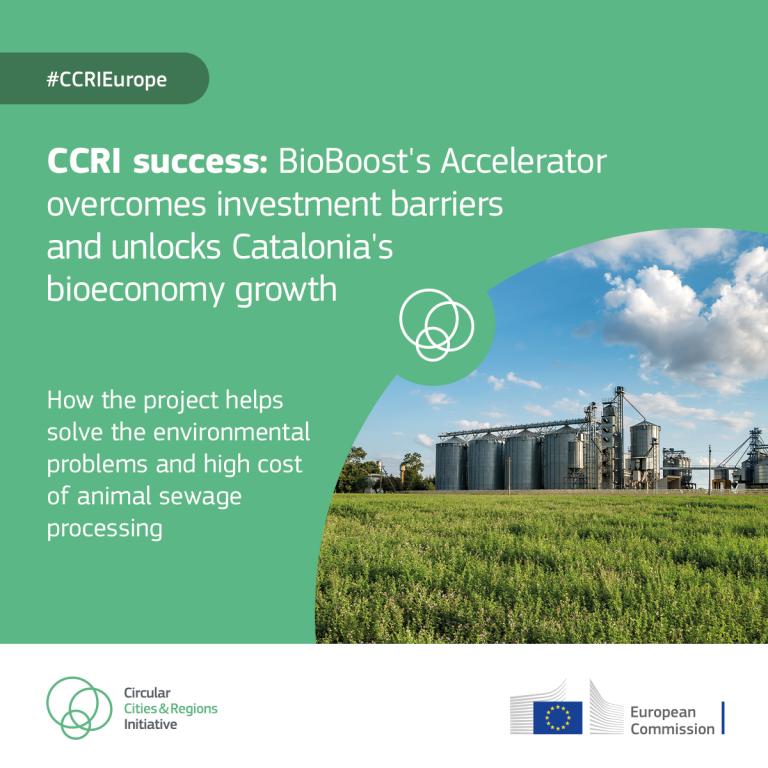CCRI success: how project BioBoost’s Accelerator overcomes investment barriers and unlocks Catalonia’s bioeconomy growth
Published on 23.10.2024
By delivering Project Development Assistance (PDA) to circular economy projects, the BioBoost project has successfully grown the bioeconomy in Catalonia, Spain with its ‘BioBooster Accelerator’. To drive EUR 30 million of investment for circular economy in the region, BioBoost has identified the systemic barriers that block bioeconomy projects from reaching the investment stage to guide projects though complex policy. BioBoost also has succeeded in reducing carbon emissions by transforming biogas into fuel for tractors and is looking towards the future of developing high-quality, circular fertiliser from organic animal waste.

More information
As a Circular Cities and Regions Initiative (CCRI) Project, BioBoost provides research and innovation knowledge to circular economy projects in Catalonia, Spain. Aiming to ensure investment of EUR 30 million in circular economy projects and advance bioeconomy projects’ Circular Systemic Solutions, BioBoost helps solve the environmental problems and high cost of animal sewage processing.
The challenge: bioeconomy projects need significant investment to replace fossil fuel
Using fossil fuels to produce energy, make plastics and produce chemicals has a price: excessive CO2 emissions are worsening climate change and reliance on global fossil fuel supply chains reduces the economic stability of European cities and regions that do not make use of their local, sustainable resources.
Circular economy projects are the answer to this environmental problem. However, they often face a lack of investment as well as administrative, systematic and policy barriers that prevent circular economy projects from getting off the ground.
BioBoost’s one-stop-shop PDA Accelerator generates EUR 30 million in investment
This is where the BioBoost project comes in. As a CCRI research and innovation project, funded by Horizon 2020 and Horizon Europe, BioBoost’s circular PDA ‘Accelerator’ services aim to catalyse EUR 30 million of additional investment by the end of 2025 with an ‘Accelerator Office’ that provides PDA services to regional bioeconomy projects. This investment goal represents an 18-times multiplier on EU investment.
The BioBoost project’s Accelerator has successfully offered tailor-made support to bioeconomy projects at every stage of development in Catalonia. Operated by an experienced team of circular economy experts, the Accelerator Office acts as a ‘one-stop-shop’ to local circular and bioeconomy projects.
As project coordinator Emma Pipó Ollé explains, “The goal is to remove barriers that projects typically face, such as lack of expertise, funding, or market access, by offering a streamlined path from concept to investment readiness.” In the process, BioBoost is transforming Catalonia into a collaborative, circular ecosystem.
Specifically, BioBoost helps circular economy Accelerator areas gain permits and certifications for their Circular Systemic Solutions and gives technical assistance like engineering design and lab testing for these solutions.
BioBoosting other European cities and regions
Focused on investor-oriented business plans as well as environmental impact assessment, BioBoost works to ensure circular economy projects are ready for implementation and attractive to stakeholders, guaranteeing investment and helping cities and regions to get their Circular Systemic Solutions off the ground.
BioBoost receives support from the CCRI to speed up the implementation of the circular economy in Catalonia. This partnership enables the project to network with other CCRI projects, and Emma Pipó Ollé already expects that BioBoost’s success can support the other regions:
“BioBoost is striving to enhance the circular economy through establishing a collaborative environment where various stakeholders can work together to advance bioeconomy projects. Through knowledge sharing, BioBoost plans to disseminate its findings and experiences to aid other regions in implementing similar initiatives.”
BioBoost produces innovative bio-based fuel
In the city of Alcarràs in Catalonia, BioBoost has created links between 600 cattle and pig farms to deal with the excessive amount of animal excrement and agricultural biowaste by transforming biogas into fuel for tractors.
Through the development of a ‘gas station’ at the ‘Alcarràs Bioproductors BioBoost plant’, the project uses livestock waste for electricity production and has the potential to mobilise EUR 7.8 million of additional investment in the bioeconomy.
With the aim of producing biogas suitable for agricultural vehicle engines, like tractors, BioBoost solves several issues with one innovative, circular systemic solution. This initiative both contributes to the renewable fuel distribution and the decarbonisation of agricultural activity and offers a way to make value from accumulated livestock waste.
As Emma Pipó Ollé explains, the BioBoost plant “has the potential to enhance the sustainability and profitability of primary producers by reducing costs, diversifying income streams, and creating value-added products, while also minimising residual biomass and the environmental impact of primary production.”
The future of BioBoost
The BioBoost project’s goals do not end with millions in investment for circular economy projects nor with the Alcarràs plant’s conversion of biowaste to fuel. In fact, the BioBoost is looking for more innovative ways to derive value from biowaste through more Circular Systemic Solutions.
BioBoost has proposed to expand into the fertiliser market, offering bio-based fertiliser products such as liquid fraction (which is rich in ammonium sulfate for field fertigation) and high-quality organic fertilisers with ecological certification (produced from solid fraction waste). This organic and regenerative agriculture production model both contributes to CO₂ capture and innovates waste management in rural areas.
Streamlining administrative procedures, legalising facilities, and helping projects apply for grants, BioBoost has successfully accelerated the rate of investment for circular projects in Catalonia. This not only has the benefits of reducing carbon emissions and the regions’ dependency on fossil fuels, but it also reduces the economic and policy barriers that prevent bioeconomy projects from reaching the investment stage in the first place.
Ultimately, BioBoost’s success in catalysing the circular economy through its PDA assistance, its innovative circular business models, and bio-based products will mobilise EUR 30 million in Catalonia and innovate the bioeconomy across Europe’s cities and regions.

including bio-based economy
e.g. chemicals, textile, ceramics, glass, cement, steel, bio-based industries
predominantly urban regions, intermediate and predominantly rural regions, refer to TERCET typology NUTS 3 region



